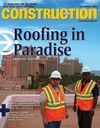Are your finances protected from disaster?
Recent catastrophic events have demonstrated that homes and businesses can be wiped out in a matter of hours—you must protect yourself.
Recent catastrophic events, ranging from natural disasters to terrorist attacks, have clearly demonstrated that the homes and livelihoods that Americans have invested in over many years can be wiped out in a matter of hours. Once displaced, many victims of disasters like hurricane Katrina struggle to get back on their feet financially. Even if you are not the victim of a disaster, you may still feel the effects of one from a financial standpoint.
That was the case for Americans across the country after the Katrina disaster. Many felt the effects of higher energy prices and other types of inflation. While there is little that can be done to prevent a disaster from striking, there are several steps you can take to protect you and your family from financial ruin should some type of disaster occur.
Store important documents in an “evacuation box.” Collect and copy all of your key financial and personal documents, including passports, birth certificates, marriage licences, wills, property deeds, insurance policies, mortgage records, car titles, stocks and bond certificates. Make copies of the front and back of all credit cards as well as driver licenses. Also, make a list of all account numbers as well as a written and photographic record of all valuables. You should also have an envelope with enough cash to last you and your family 3-4 days.
All essential documents should be stored in a bank safe deposit box or in a waterproof and airtight fireproof safe that is easily accessible. Inform family members and a trusted friend of this location in the event that you are unable to retrieve it yourself.
Make sure you have access to cash. Avoid tying up all your assets in real estate or investments that cannot be tapped without incurring significant penalties. Maintaining funds that are accessible, which are equal to three to six months’ income in a money market, or a 100 percent liquid account should be one of your top financial priorities. You may also want to have one credit card with a higher than average limit in case of emergency. If you have a 401k account, find out if loans are permitted in the plan.
Protect your property. If you live in an area that is frequently hit by natural disasters, consider what you can do to mitigate potential damage to your property. Depending on the type of disaster likely to strike, you may want to take steps such as anchoring the foundation and roof, installing hurricane shutters, adding fire resistant siding, securing objects that can fall in the event of earthquakes, moving electrical panels to higher levels and clearing brush from the foundation of your home or business. If you are uncertain which efforts need to be made, call a building inspector and ask for recommendations. It will cost money in the short run, but could save thousands in the long run. Also, some of these measures can be used to negotiate discounts on your homeowners insurance.
Purchase insurance and review policies regularly. Many people who have lost their homes to disaster find that their policies do not cover the cost of rebuilding. Review your homeowners insurance annually to be sure it reflects the actual replacement cost of your home as well as the contents. This is essential if you have made improvements or if you are in an area where the value has risen significantly. Be aware of the limits of the policy such as flooding or hurricane damage. In some locations, a separate policy must be purchased. If the insurance you need is not available through a private carrier due to location, such as disaster prone areas, find out whether state or federal programs are in place. In addition to homeowners insurance, review your life insurance and disability coverage. Is the amount sufficient to protect your family? Chances are that you and your income have changed since your original insurances were put into place. Review your health insurance. Are you covered by Cobra or a State Continuation program in the event you are no longer able to work? Find out what the premium will be—you will be shocked at the cost of healthcare.
Your individual circumstances will determine what steps should be taken to protect you and your family in the event of disaster. You should also consult with your attorney about whether you would benefit from additional legal protections, such as trusts, powers of attorney or living wills. Remember, disaster strikes with little or no warning; the time to prepare is now.





